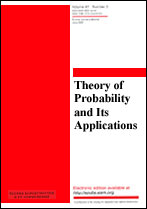|
|
Teoriya Veroyatnostei i ee Primeneniya, 1976, Volume 21, Issue 2, Pages 235–252
(Mi tvp3341)
|
 |
|
 |
This article is cited in 32 scientific papers (total in 32 papers)
Routh limit theorems on large deviations for Markov stochastic processes. I
A. D. Wentzell
Moscow
Abstract:
Let $\xi^{\alpha}(t)$, $\alpha>0$, be a family of stochastic processes defined on probability spaces $(\Omega^{\alpha},\mathscr F^{\alpha},\mathbf P^{\alpha})$ and let the process $\xi^{\alpha}$ become «more and more deterministic» as $\alpha$ tends to infinity.
Suppose we are interested in the limiting behaviour of the probability $\mathbf P^{\alpha}\{\xi^{\alpha}\in A\}$ that the sample function of the process belongs to a certain set in the function space. This problem is analogous to that of large deviations for sums of independent random variables. In other words, it is the problem of large deviations for stochastic processes.
Rough limit theorems on large deviations are those which describe the asymptotic behaviour of the probabilities in question up to logarithmic equivalence. They may be stated using a functional $S(\varphi)$ such that the probability $\mathbf P^{\alpha}\{\rho(\xi^{\alpha},\varphi)<\delta\}\approx\exp\{-\alpha S(\varphi)\}$
for large $\alpha$ where $\rho$ is the distance in the function space. (For precise formulations see [11].)
In the first part of this paper we deal with stochastic processes of certain classes, regardless of whether they belong to some families of stochastic processes or not. They are, firstly, Markov chains in $R^r$, secondly, locally infinitely divisible processes in $R^r$. The main requirement is that they should have finite exponential moments. For these processes we introduce a functional $I(\varphi)$, called the action functional (the term was introduced by М. I. Freidlin) and we prove certain estimates for probabilities of some events in terms of the functional $I$ (Sections 3, 4). For a non-homogeneous continuous time Markov process $(\xi(t),\mathbf P_{t,x})$, $0\le t\le T$ the action functional has the form
$$
I_{0,T}(\varphi)=\int_0^T H(t,\varphi(t);\dot{\varphi}(t))\,dt
$$
where
\begin{gather*}
H(t,x;u)=\sup_z[\langle z,u\rangle-G(t,x;z)]
\\
G(t,x;u)=\lim_{\Delta t\downarrow 0}(\Delta t)^{-1}[\mathbf M_{t,x}\exp\{\langle z,\xi(t+\Delta t)-x\rangle\}-1].
\end{gather*}
In the second part of this paper we consider families of stochastic processes $\xi^{\alpha}(t)$. The action functional for them turns out to be equivalent to the product $\alpha\cdot S(\varphi)$. If the remainder terms in the estimates of § 3, 4 are $o(\alpha)$ as $\alpha\to\infty$, then we deduce from them rough limit theorems for $\xi^{\alpha}$.
Received: 08.10.1974
Citation:
A. D. Wentzell, “Routh limit theorems on large deviations for Markov stochastic processes. I”, Teor. Veroyatnost. i Primenen., 21:2 (1976), 235–252; Theory Probab. Appl., 21:2 (1977), 227–242
Linking options:
https://www.mathnet.ru/eng/tvp3341 https://www.mathnet.ru/eng/tvp/v21/i2/p235
|


|




 Contact us:
Contact us: Terms of Use
Terms of Use
 Registration to the website
Registration to the website Logotypes
Logotypes








 Citation in format
Citation in format 
